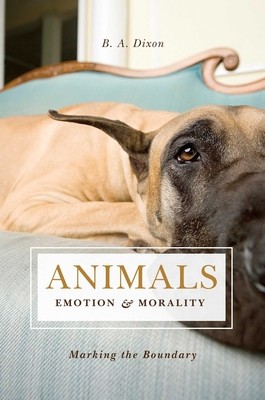
- We will send in 10–14 business days.
- Author: B A Dixon
- Publisher: Prometheus Books
- ISBN-10: 1591026296
- ISBN-13: 9781591026297
- Format: 15.4 x 22.8 x 1.6 cm, softcover
- Language: English
- SAVE -10% with code: EXTRA
Reviews
Description
It seems obvious that animals have emotions. Dogs bark with excitement when their masters return home, snarl aggressively at the approach of a stranger, and cower with anxiety at the vet's office. Our ordinary ways of talking about animals suggest that animals and humans are emotional kin.
In this exploration of our emotional kinship with animals, philosopher B. A. Dixon invites the reader to consider what is philosophically controversial about the idea that animals have emotions. Dixon guides the reader through a tangle of philosophical issues related to the concept of emotion and the various ways in which emotions are morally significant. She demonstrates that claims about animal emotion often stand in for a more fundamental property it is believed that animals and humans share--namely morality.
Do some animals have "morally laden" emotions? Dixon examines various arguments in favor of this idea and finds them lacking. Her close analysis elucidates the concept of emotional kinship, the role of emotions as virtues, Darwin's principle about evolutionary continuity, the nature of primate empathy, the possibility of morally appraising children and animals, and how the animal narrative should be used as a methodology for thinking about the animal mind. Each chapter begins with an animal story or anecdote to illustrate the theme to be covered.
Dixon concludes that we are unwarranted in attributing to animals morally laden emotions.
EXTRA 10 % discount with code: EXTRA
The promotion ends in 20d.04:35:39
The discount code is valid when purchasing from 10 €. Discounts do not stack.
- Author: B A Dixon
- Publisher: Prometheus Books
- ISBN-10: 1591026296
- ISBN-13: 9781591026297
- Format: 15.4 x 22.8 x 1.6 cm, softcover
- Language: English English
It seems obvious that animals have emotions. Dogs bark with excitement when their masters return home, snarl aggressively at the approach of a stranger, and cower with anxiety at the vet's office. Our ordinary ways of talking about animals suggest that animals and humans are emotional kin.
In this exploration of our emotional kinship with animals, philosopher B. A. Dixon invites the reader to consider what is philosophically controversial about the idea that animals have emotions. Dixon guides the reader through a tangle of philosophical issues related to the concept of emotion and the various ways in which emotions are morally significant. She demonstrates that claims about animal emotion often stand in for a more fundamental property it is believed that animals and humans share--namely morality.
Do some animals have "morally laden" emotions? Dixon examines various arguments in favor of this idea and finds them lacking. Her close analysis elucidates the concept of emotional kinship, the role of emotions as virtues, Darwin's principle about evolutionary continuity, the nature of primate empathy, the possibility of morally appraising children and animals, and how the animal narrative should be used as a methodology for thinking about the animal mind. Each chapter begins with an animal story or anecdote to illustrate the theme to be covered.
Dixon concludes that we are unwarranted in attributing to animals morally laden emotions.


Reviews